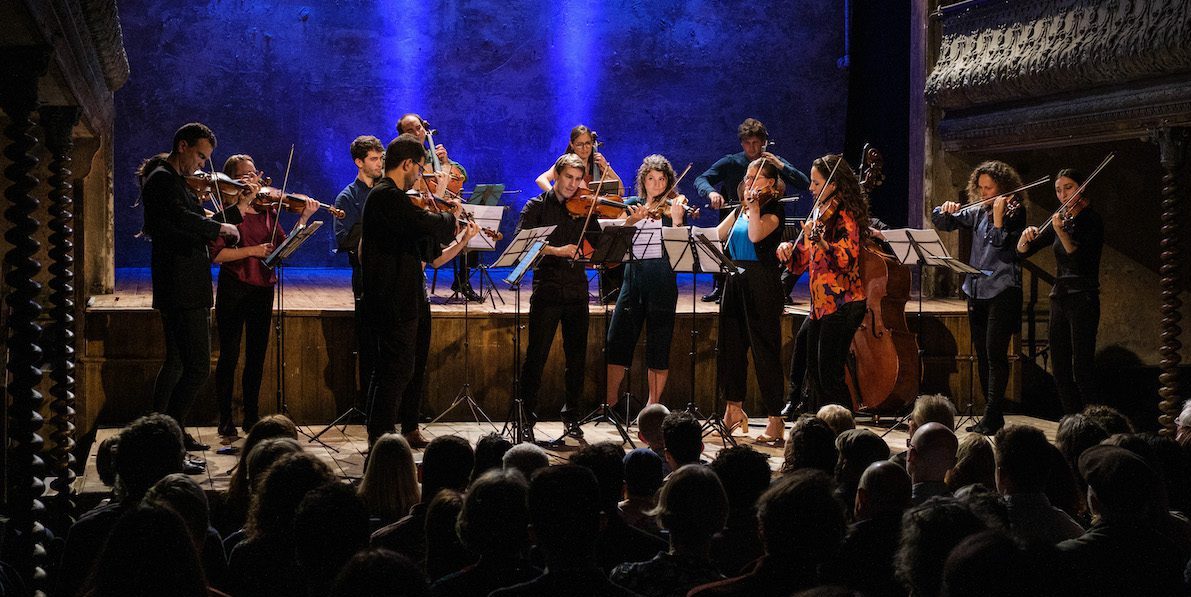For most musicians the last few years have been a bleak experience of lost work, a maze of paperwork before travel is possible, and the fundamental loss of the camaraderie of performance. But the string ensemble ‘United Strings of Europe’ has found opportunity in adversity in surprising ways. They managed to record a new disc finding hope and reflection in hardship and setback and have now shared some of it in live performance at Wilton’s.
Wilton’s and chamber music at the larger end of the scale are a good match. With the cellos seated on the upper stage and the remainder of the players standing below, the stage is properly filled, and a balanced sound is thereby projected outwards into the body of the hall. The overall dramatic mood is accentuated by changes at points in the lighting scheme.
Leader Julian Azkoul introduced each item in the absence of a programme. He is a natural communicator, reaching out to the audience with the right balance of information, enthusiasm and empathy for different genres. The same can be said for his arrangements which intuit different ways in which music originally written for other formats can resonate with new meaning in a string ensemble; or alternatively where music written for other string combinations can throw off other rare echoes in a smaller or larger combination of instruments.
The evening began with one of several contemporary compositions that echoed the classic sound world of English string music. Joanna March’s ‘In Winter’s House’ started off life as a choral piece for Tenebrae. In this evocative reconfiguring, the space between the shifting harmonies summoned up the chordal, solemn, cathedral world of Vaughan Williams’ ‘Fantasia on a theme of Thomas Tallis.’ It was followed by Caroline Shaw’s ‘Entr’acte’, inspired originally by a Haydn quartet, but spinning off in many different variations of theme, texture and mood, showing off the harsh and percussive potential of modern string writing as much as its lyricism.
In many ways the heart of the evening lay in Osvaldo Golijov’s ‘Three Songs for Soprano’ where the ensemble was joined by the refined contribution of Ruby Hughes, who presented her voice very much as a fine-spun instrumental line, woven around the string layers of the players. These songs, with texts in Yiddish, Galician and English, reflecting different phases of the composer’s life, presented a huge dynamic range, which the performers exploited with rare skill. For example, Hughes took her voice down to a slender thread of tone in the second song, the meditation, ‘Lua descolorida’ whereas elsewhere the ensemble generated orchestral power and intensity in extended sections of their own.
In the second half we began with Philip Herbert’s ‘Elegy: In Memoriam’ which reminded us in plangent string language which evoked Gerald Finzi that it is nearly 30 years now since the murder of Stephen Lawrence in Eltham, the consequences and significance of which are still very much with us. A different kind of grieving followed in the form of Richard Strauss ‘Metamorphosen’, originally conceived as a meditation on the ruins of Germany in 1945. It was bracing to hear this familiar work performed at a faster tempo than usual, with an unusual muscularity of delivery and incisive unsentimental clarity. Having fifteen strings rather than the usual twenty-three allowed the inner lines of writing to shine through giving greater access to the piece’s symmetry and logic.
This was a most satisfying evening on every level. The playing was of a superb technical quality, and the choice of material and apt arrangements made a convincing case for this ensemble’s particular niche. Above all the focus on hard-won renewal after dark times gave ample room for the audience to engage, creating imaginative space for all present to reflect on their own experiences of the most recent past. Animated conversations in the foyer afterwards suggested that the next performers of this ensemble are eagerly anticipated.

